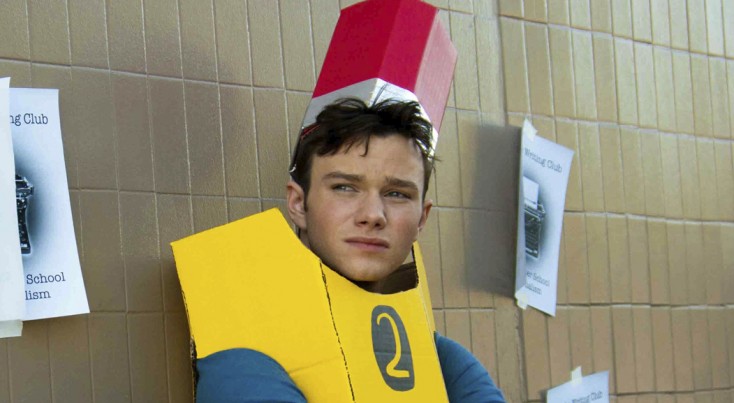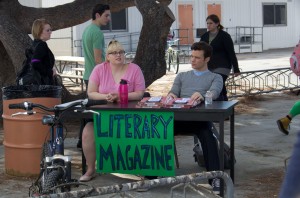By ANGELA DAWSON
Front Row Features
HOLLYWOOD—Chris Colfer is best known as the openly gay singing sensation Kurt Hummel on the hit Fox TV series “Glee.” But Colfer is more than just an Emmy award-winning actor with amazing pipes. He’s also a writer, with a growing list of credits to his name. At just 22, he already has been named among Time magazine’s 100 most influential people in the world.
Last year, he published his first book, “The Land of Stories,” a children’s book that landed on the New York Times bestseller list.
He now has another book and his first produced screenplay hitting the bookstores and arriving in theaters concurrently called “Struck By Lightning.”
It’s the story of an ambitious high school student who is literally struck dead by lightning before he has a chance to realize his dreams, and then tells his story in a series of flashbacks. In this dramedy, Colfer not only wrote the screenplay and executive produced the project, he also stars as the lead character, Carson, who always speaks his mind, speaks up against would-be bullies and never allows anyone to walk all over him. He co-stars alongside Allison Janney (who plays his mother), Dermot Mulroney (who plays his philandering dad), Rebel Wilson, “Modern Family’s” Sarah Hyland and Christina Hendricks in the Brian Dannelly-directed film.
Dressed impeccable in a pink-hued preppy ensemble for an interview, the ubiquitous Colfer discussed his first leading role in a feature film, and what’s ahead for him on “Glee.”
Q: How much did you base Carson on people you know or things you’ve experienced?
Colfer: Carson definitely was someone I wished I was like in high school. He really wears disgust on his sleeve. He vocalizes his opinion right in the moment rather than internalizing it like I did. I’d go home and cry and write rather than express my frustration in the open. The whole movie’s based on elements that I experienced, but it’s not autobiographical. I can’t reiterate that enough because my mother is terrified people are going to think that (Alison Janney’s alcoholic character) is based on her. She wants to make clear that she and my dad are happily married and their relationship is not like the one (depicted in the movie).
Q: You have a friend like Malerie (Rebel Wilson’s character), though. Right?
Colfer: Yes. She’s the only character based on someone I know completely.
Q: Was it cathartic to get to rewrite history, in a way?
Colfer: Absolutely. And it’s also sad because I wrote tragic scenes like the homecoming scene, and I think, oh, that happened to me. But it was very therapeutic. I began writing this in high school, or I came up with the idea in high school. It was a very therapeutic way to get through the daily struggles of being in high school.
Q: What were you like in high school? Were you ambitious?
Colfer: I was very ambitious, but I was not outspoken whatsoever. I was very shy and I internalized everything. I was very much a victim whereas Carson doesn’t let himself become a victim. People pick on him and give him a hard time but he doesn’t care. He just thinks they’re a bunch of idiots. He lets them think they’re making an impact (on him) but they’re really not. He’s got his own thing going on.
Q: You wrote the original script when you were 16. Did you change anything when you rewrote it or did you try to maintain that youthful voice that was already there?
Colfer: I knew I wanted to write screenplays when I was in high school. It’s very strange but even when I was 16, I wanted something like this just in case I got a job and had a platform to create or pursue it, which is kind of what ended up happening. My first draft was about 200 pages long and it was on Microsoft Word, so the format was all crazy, and it was very youthful. But things that I changed were things like stage directions and typos. The youthful dialogue is still kind of the same. I always remember what I wanted the characters to say, the wording of their lines so the language kind of stayed the same. But it adds an element, because it was written youthfully for youth.
Q: Which did you write first: the book or the screenplay?
Colfer: The screenplay. I never thought it would make a good book until my publishers for “The Land of Stories” came to the Tribeca Film Festival and saw the movie. They fell in love with it and asked me if I would adapt it into a novel. My only hesitation was that I didn’t know how to turn it into a novel because the story’s so unusual. It’s starts out with the main character being killed, and it goes back and forth (between him being alive and dead).
Q: Did you change the structure?
Colfer: No. I decided the best way to write the novel would be to make it Carson’s journal, which he kept when he was alive. The book covers the last three months of his life so it’s a very intimate version of his story rather than the movie, which is told from an outside perspective.
Q: You’ve got a great cast in this. Did you have to blackmail anyone or twist any arms?
Colfer: No. But I wouldn’t put it past me. It was very easy to get people to get on board.
Q: What was Rebel Wilson like off screen? Is she as funny as she is on film?
Colfer: She saves a lot of it for the camera, but she is hysterical. I’ll tell you something: she’s a great texter. I’ve gotten some amazing texts from her. She’s Australian so she spoke to us (off-camera) in her regular accent. She’s fantastic and I love her.
Q: What was your biggest challenge in getting the film made?
Colfer: Finding (an independent producer) that wanted to do it because there were many options in the beginning of going a studio route. I knew that if it went that route, than “Struck By Lighting” wouldn’t be what it turned out to be. It would be about Carson losing his virginity and I would not be in it. So I’m very glad we went the independent route because I had total control of what the story was. I wanted it to be about ambition and dreams and goals, not sex and drugs and popularity, like most other teenage films are about.
Q: Does (“Glee” creator) Ryan Murphy inspire you to work so hard?
Colfer: Absolutely. I was very driven long before I met Ryan but I think he’s a perfect example of showing that it’s possible for someone to do everything and to do so much at once.
Q: What did you learn about screenwriting that will help you as an actor?
Colfer: I think I have more sympathy for writers now. I went into it with an actor’s bias so I don’t know if (my perspective) really changed.
Q: Have your “Glee” co-stars seen the film yet?
Colfer: A few of them have. We had a screening for them. Kevin (McHale, who plays wheelchair bound Artie) just shook his head at me and walked away. It was a compliment. Amber (Riley, who plays Mercedes) laughed a lot. I think they liked it and they are very supportive.
Q: How were you able to juggle the TV show with writing and starring in this movie?
Colfer: My social life was kind of a casualty with it, and still kind of is. It’s slowly recovering. There’s so much downtime on set, which some actors find frustrating, but I was like, “We’re down for five minutes? Fantastic. I’ll write this scene” or “I’ll edit this chapter.” I’m a great multi-tasker with respect to projects. I’d also write on weekends or whenever I had spare time.
Q: What do you want audiences to take away from this film?
Colfer: I hope it inspires aspiration. I think you can fulfill what you want to fulfill as long as you’re willing to go out and try doing it.
Q: Are you planning to give up acting to write?
Colfer: I love acting. I love pretending to be someone else. I find it very therapeutic. But I think I really fell in love with creating the character and portraying the character. That’s one of my new favorite things. Even when I was little, it was all about playing pretend. That’s what I’m addicted to.
Q: Do you have any advice for the Carsons out there?
Colfer: Don’t let your imagination be discouraged by the lack of imagination in others.
Q: Are you working on another project?
Colfer: Constantly. If people only knew the projects I’ve been working on that haven’t yet seen the light of day, they’d be shocked. It’s crazy the number of things I’m working on and coming up with.
Q: Will you stay with “Glee” or move on?
Colfer: We’ll see. It’s not fully my decision.
Q: How exciting was it to see your book published?
Colfer: It’s like a having a baby, only less placenta, I imagine.






